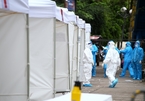Assoc. Prof. and PhD Le Thi Quynh Mai, deputy director of the National Institute of Hygiene and Epidemiology spoke about the differences between the rapid tests and the RT-PCR tests used in the fight against the pandemic.
 |
| Assoc. Prof. and PhD Le Thi Quynh Mai, deputy director of the National Institute of Hygiene and Epidemiology. Photo suckhoedoisong.vn |
Many people do not fully understand the types of COVID-19 tests in Vietnam and even misunderstand the rapid test, which shows results within 20 minutes. Could you tell us the role of the rapid test? Who needs to take the rapid test and when should the patient take it to get accurate results?
Currently, there are two types of COVID-19 rapid tests, including a test to detect antibodies for the SARS-CoV2 virus and a test to detect antigens.
The antibody test only detects antibodies the immune system develops in response to the virus, not the virus itself. It is used to detect if someone was previously infected with the virus.
Meanwhile, the antigen test detects the presence of a specific viral antigen, which implies current viral infection. It is used to detect infection cases.
As far as I know, there is only a rapid antibody test available in Vietnam. This type of test is often used to assess community immunity after an epidemic has ended.
At a recent virtual meeting with leaders of the health departments in 63 provinces and cities nationwide, Prof. Dr. Nguyen Thanh Long, Acting Minister of Health said the ministry did not provide rapid test kits, but encouraged people to take reverse transcription-polymerase chain reaction (RT-PCR) test in Hanoi. What’s the difference between the two types of tests?
In the strategy for COVID-19 pandemic prevention and control, in Vietnam as well as many countries, testing to detect infections in the early stage and put them in quarantine to minimise transmission is the key to controlling the pandemic. The antigen tests will work in this situation.
The rapid antibody detection test, which is currently available in Vietnam, doesn’t really work. The RT-PCR is a method of determining the presence of the virus in the patient’s sample through the genetic material of SARS-CoV-2 virus. The realtime RT-PCR results find infected patients and the patients will be put under quarantine and given timely treatment.
Each type of test has its own merits, depending on the subject and the period of time.
How can we develop a specific strategy for SARS-CoV-2 tests to achieve the most accurate results?
The National Steering Committee for COVID-19 prevention and control has launched the general testing strategy and updated it in each specific period. However, in each locality, it is necessary to build and select test methods suitable for the pandemic control of each locality based on its facilities and human resources.
The localities must ensure compulsory requirements on biosafety practices, technical procedures, evaluation and reporting of results. VNS/SK-DS

Quick COVID-19 testing results not proof of infection: health official
Vietnamese health authorities on Wednesday insisted that the standard, slower COVID-19 testing method remains the most reliable, while less accurate quick testing is more suitable if the case number gets drastically higher.

Vietnamese COVID-19 test kit eligible to be sold in Europe
A new COVID-19 test kit developed by researchers of Hanoi University of Science and Technology has been granted a certification that allows the biological product to be sold in the European market.